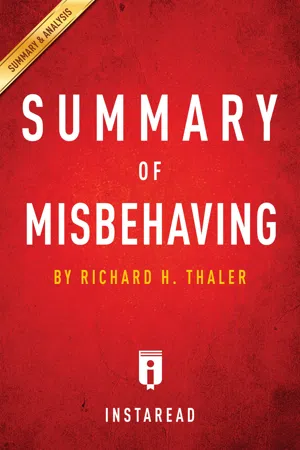
- English
- ePUB (mobile friendly)
- Available on iOS & Android
About this book
Summary of Misbehavingby Richard H. Thaler | Includes Analysis
Preview:
Misbehaving: The Making of Behavioral Economics is an introduction to behavioral economics and an account of Richard H. Thaler’s role in developing and popularizing the field.
The traditional economic theory of the 1970s presumed that people made economic decisions rationally. In this economic vision, rational individuals—or Econs, as Thaler calls them—know what they want, and they know how much they value the things they want…
PLEASE NOTE: This is key takeaways and analysis of the book and NOT the original book.
Inside this Instaread of Misbehaving:
- Overview of the book
- Important People
- Key Takeaways
- Analysis of Key Takeaways
About the Author
With Instaread, you can get the key takeaways and analysis of a book in 15 minutes. We read every chapter, identify the key takeaways and analyze them for your convenience.
Frequently asked questions
- Essential is ideal for learners and professionals who enjoy exploring a wide range of subjects. Access the Essential Library with 800,000+ trusted titles and best-sellers across business, personal growth, and the humanities. Includes unlimited reading time and Standard Read Aloud voice.
- Complete: Perfect for advanced learners and researchers needing full, unrestricted access. Unlock 1.4M+ books across hundreds of subjects, including academic and specialized titles. The Complete Plan also includes advanced features like Premium Read Aloud and Research Assistant.
Please note we cannot support devices running on iOS 13 and Android 7 or earlier. Learn more about using the app.
Information
Analysis
Key Takeaway 1
Key Takeaway 2
Table of contents
- Overview
- Important People
- Key Takeaways
- Analysis
- Key Takeaway 2
- Key Takeaway 3
- Key Takeaway 4
- Key Takeaway 5
- Key Takeaway 6
- Key Takeaway 7
- Key Takeaway 8
- Key Takeaway 9
- Author's Style
- Author's Perspective
- References